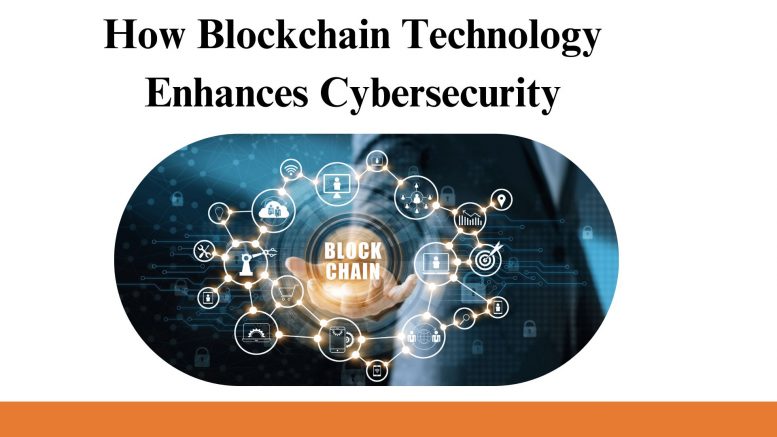In an technology in which cyber threats are constantly evolving, agencies and individuals searching for revolutionary answers to secure their records and structures. One such groundbreaking generation that has emerged as a powerful device for cybersecurity is blockchain. Initially designed to assist cryptocurrencies like Bitcoin, blockchain has now found programs in diverse sectors, mainly in enhancing cybersecurity. This article explores how blockchain generation strengthens cybersecurity measures and mitigates virtual threats.
Understanding Blockchain Technology
Blockchain is a decentralized and distributed ledger machine that statistics transactions throughout more than one computer systems. Each transaction is encrypted and stored in a block this is then connected to the preceding block, forming a chain. This form guarantees transparency, immutability, and protection, making blockchain a reliable answer for cybersecurity traumatic conditions.
Ways Blockchain Enhances Cybersecurity
1.Decentralization Reduces Single Points of Failure
Traditional centralized systems are vulnerable to cyberattacks because of the fact a unmarried breach can compromise the whole machine. Blockchain eliminates this hazard via distributing information in the path of more than one nodes, making it difficult for hackers to aim a unmarried factor of failure.
2.Immutability Prevents Data Tampering
Once facts is uploaded onto a blockchain, it will be unchangeable, or it cannot be deleted or changed. This function ensures the integrity of crucial statistics, and it cannot be manipulated by means of our on-line world criminals or scammers.
3.Enhanced Encryption and Secure Transactions
Blockchain era employs superior cryptographic techniques to stable statistics. Transactions recorded at the blockchain are encrypted and confirmed using complex mathematical algorithms, making unauthorized get right of access to nearly not possible.
4.Improved Identity Management
Cybersecurity threats frequently incorporate identification theft and unauthorized access. Blockchain gives a decentralized identification management machine wherein clients have manipulate over their private records via cryptographic keys. This reduces the threat of identification fraud and information breaches.
5.Protection Against Distributed Denial-of-Service (DDoS) Attacks
Blockchain’s decentralized nature helps mitigate DDoS assaults through meting out information throughout a couple of nodes. Even if one node is targeted, the rest of the community remains operational, making sure persisted issuer availability.
6.Secure IoT Devices
The Internet of Things (IoT) has added numerous security vulnerabilities due to interconnected devices. Blockchain can stable IoT networks with the resource of supplying a transparent and tamper-proof method of recording device interactions, reducing the hazard of cyberattacks.
7.Smart Contracts for Automated Security Protocols
Smart contracts are self-executing agreements saved on the blockchain. They can be programmed to position into impact security protocols routinely, making sure compliance and lowering human errors that might result in protection breaches.
Additional Applications of Blockchain in Cybersecurity
1.Securing Supply Chain Data
Blockchain technology can beautify supply chain protection with the aid of using presenting a transparent and immutable ledger of transactions. This lets in save you fraud, counterfeiting, and statistics manipulation, ensuring the authenticity of goods and services.
2.Fraud Detection and Prevention
By maintaining an immutable ledger of transactions, blockchain era makes it much less difficult to stumble on anomalies and fraudulent sports. Financial establishments can use blockchain to track suspicious transactions and save you fraud in real-time.
3.Secure Cloud Storage
Centralized cloud garage solutions are at risk of facts breaches and cyberattacks. Blockchain-primarily based cloud garage solutions distribute statistics across more than one nodes, making sure extra safety and reducing the threat of unauthorized get right of entry to.
4.Protection Against Insider Threats
One of the biggest cybersecurity dangers comes from insider threats employees or people with access to sensitive statistics. Blockchain can decorate internal protection with the useful resource of preserving an immutable file of all sports, making it less difficult to music and save you unauthorized movements.
5.Safeguarding Healthcare Data
The healthcare enterprise faces big cybersecurity demanding situations, collectively with data breaches and unauthorized access to affected person information. Blockchain can ensure the security and privateness of scientific records thru supplying a decentralized and tamper-proof database.
6.Securing Voting Systems
Digital voting structures are vulnerable to hacking and election fraud. Blockchain can offer a obvious and stable voting system in which every vote is recorded immutably, ensuring election integrity and preventing tampering.
Challenges and Future Prospects
While blockchain technology drastically complements cybersecurity, it additionally comes with challenges consisting of scalability, regulatory worries, and electricity consumption. However, non-forestall enhancements in blockchain protocols are addressing those troubles, making blockchain an an increasing number of possible answer for cybersecurity.
The Future of Blockchain in Cybersecurity
As cyber threats continue to evolve, the integration of blockchain into cybersecurity strategies will become more critical. Emerging trends include:
- AI and Blockchain Integration: Artificial intelligence mixed with blockchain can provide superior chance detection and response mechanisms.
- Zero-Trust Security Models: Blockchain can guide zero-accept as true with frameworks, ensuring that no entity is relied on by means of default, thereby strengthening safety.
- Decentralized Finance (DeFi) Security: With the rise of DeFi programs, blockchain is becoming critical in securing economic transactions and preventing fraud.
- Privacy-Enhancing Technologies: Innovations like 0-knowledge proofs are making blockchain extra privacy-centric, permitting stable transactions without revealing touchy statistics.
Conclusion
Blockchain era offers a strong framework for enhancing cybersecurity via making sure information integrity, decentralization, encryption, and consistent identification control. Its packages span throughout numerous industries, from finance to healthcare, making it a flexible device in opposition to cyber threats. As cybercriminals boom extra state-of-the-art tactics, adopting blockchain-based totally definitely answers can be critical for defensive virtual assets and infrastructure. Organizations and governments ought to find out blockchain-driven cybersecurity measures to live earlier within the combat in opposition to cybercrime.


Be the first to comment on "How Blockchain Technology Enhances Cybersecurity"